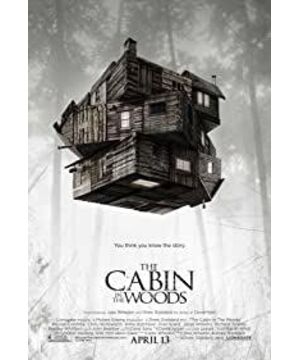The movie doesn't break the stereotype, it just embeds it in a play-within-a-play mode. The trick of embedding is that instead of spending a lot of brain cells to create new dramas, it deconstructs old dramas and creates new gimmicks in a way that is equivalent to behind-the-scenes footage. Many people say that the tidbits are more powerful than the main feature, and that's why.
But watch out! We didn't know this at first. We only know that there is a company that is creating a live TV broadcast of a suspected Truman show, and the five young men and women who rushed to the camp are their target players. And whenever it reaches a breaking point (such as a girl preparing to undress), the camera will retreat, bringing out the attention and comments of the staff in front of the big screen, as well as betting.
But when they saw the scene of the tragic death of the wave girl, the audience was really shocked! It was originally just a "play", and the audience would not be surprised. Because the cliché of the wolf girl's first hanging point is too much. But after knowing that this is not a "play", but a "play within a play", the audience must be surprised! Because according to common sense, no live reality show will design a plot to end the life of the person involved. That's not a reality show, that's a torture movie. And torture movies is a serious crime, it can only be carried out in secret, never live on TV! unless! Unless you tell me it's not a mild Truman show, but a multi-award-winning reality-killing show similar to Schwarzenegger's! But that kind of live TV player needs to know the rules of the game in advance!
I think there is something wrong with the movie at this moment:
Live show is a means of realism, and ghosts and fantasy itself will not follow the logical thinking of realism. Stewart caught a glimpse of the salesman out of the window carrying a box in the rainy night and inferred that he killed his wife and mutilated her body and immediately called the police, so why did the live broadcast staff not use it when they saw the girl was killed? You should explain the film clearly, not drag it to the end. Because this directly involves how the audience understands the subsequent plot development and the behavioral logic of the characters. For example, the little smoker accidentally discovered the camera under the lamp holder, and suddenly realized that it was a reality show! But what does this sudden realization mean to him? Could it be that the previous killings were all fake, the zombies were all dressed up by staff, and that they would not encounter any real danger at all? ... Of course, the film finally gave the answer in a mythical way of God's Condemnation, but with this answer back to the previous plot, you still don't understand what the little smoker realized from the discovery of the camera! Because you still don't know the time and space background he is in. Could it have been the year 30,000 AD when killings could be broadcast live on TV, and teenage boys and girls had to be cast into hell? ...
View more about The Cabin in the Woods reviews











